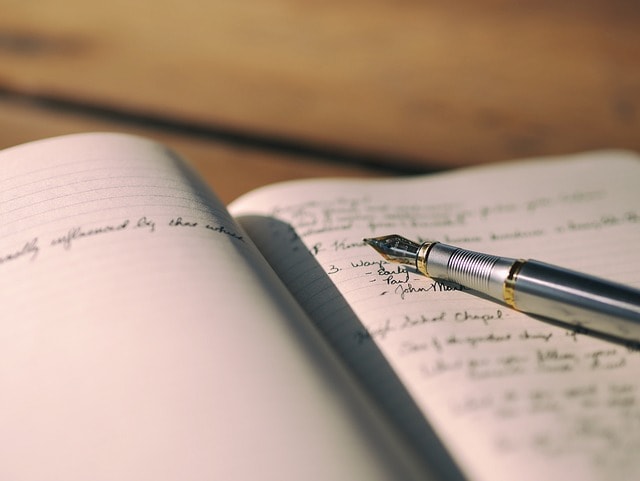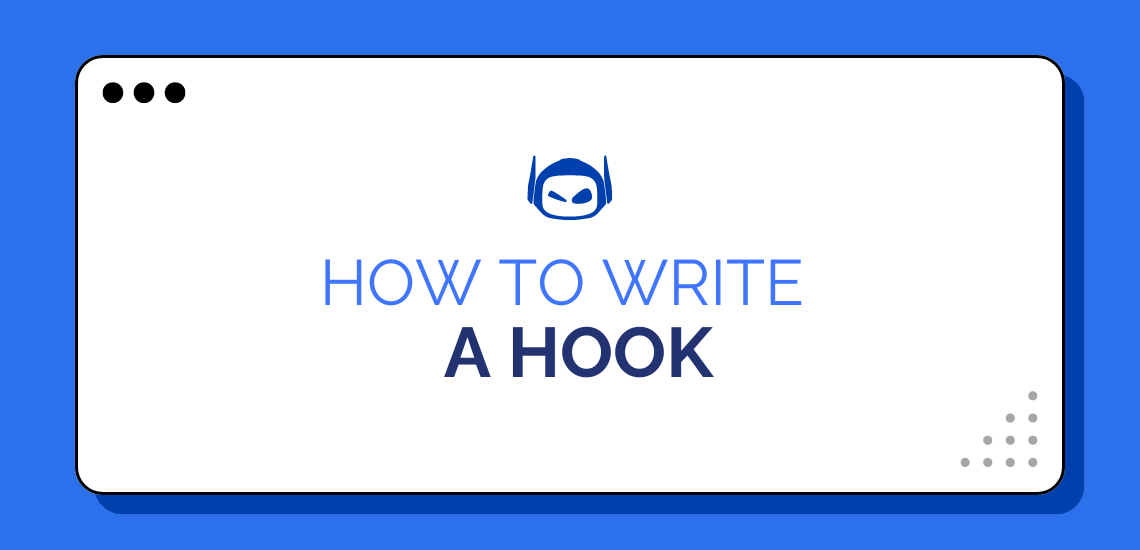How To Write a Hook To Capture Your Reader’s Attention
Are you worried that your essay will start out flat and you’ll fail to capture the attention and imagination of your target audience? Then it’s a good idea to make time to study how to write a hook to grab the reader’s attention.
In our post, you’ll see that there are many different approaches that you can take to create a winning hook. We’ll provide a variety of methods so you can pick one that resonates with your writing style. This is important, especially if you are writing an essay since a good hook improves the writing flow from the very beginning.
Keep reading to discover how to write a hook for a variety of topics.

What Is a Hook?
A hook is a captivating opening sentence or question meant to engage the reader and draw them into an essay, a short story, or whatever piece of writing you may be compiling. Its primary function is to capture attention right from the start and encourage the audience to continue reading.
Here are some good essay hooks you can use to capture the reader’s attention if you are writing an essay for college:
- Startling statistics: You can present surprising facts that can shock readers and make them curious.
- Thought-provoking quotes: Using a relevant quote can inspire reflection and set the tone for the essay’s theme.
- Anecdotes: A brief and engaging story can illustrate a point and create a personal connection with the reader.
- Provocative question: Asking a question encourages readers to think critically and engage with the topic.
An effective hook raises interest and also aligns with the essay’s main argument or theme. This provides a seamless transition into the introduction. Therefore, by using a strong hook, writers can make a memorable first impression. Also, you can increase the likelihood that readers will stay engaged throughout the essay.
How To Write a Hook for an Argumentative Essay: 5 Best Practices
The most common type of essay for college students is an argumentative essay. So, it is important to know how to write a hook for an argumentative essay. In this section, we’ll share the best practices for writing an argumentative essay hook that will grab readers’ attention from the very beginning.
1. Keep It Relevant to the Topic
Make sure that your hook is directly related to your essay’s main argument or thesis. A relevant hook sets the stage for your discussion and prepares the reader for the points you will make. Also, it should seamlessly transition into your introduction. This is done by providing a clear connection between the hook and the essay’s content.
Furthermore, avoid using generic or overly broad statements that could apply to any topic. Instead, focus on a specific aspect of your argument that will intrigue your audience and encourage them to consider your perspective.
2. Be Clear and Concise
A good hook should be clear and concise to quickly capture the reader’s attention without overwhelming them with unnecessary details. Therefore, aim for a hook that is impactful yet straightforward. This allows readers to grasp the essence of your argument right away.
Additionally, avoid overly complex language or convoluted ideas that may confuse the audience. To achieve this, you’ll need to choose words that are easy to understand and convey your message effectively. A well-crafted hook sets a positive tone for your essay and encourages readers to stay engaged with your writing from the very beginning.
3. Engage the Reader
An effective hook should engage the reader emotionally by prompting them to think critically about the issue at hand. Hence, use language that evokes feelings or curiosity, whether through a compelling anecdote or a thought-provoking question.
This emotional connection encourages readers to invest in your argument and consider its implications. To enhance engagement, tailor your hook to your target audience. To achieve this, you’ll need to consider their values and interests.
You can also use a personal story to invoke mood in your writing. This is an effective way to create a compelling hook from the very first sentence.
4. Incorporate a Quote
Using a relevant quote from a well-known figure can lend credibility to your argument while providing an engaging hook. Choose a quote that resonates with your thesis and reflects the core issues of your essay.
This can be a thought-provoking statement or a powerful observation related to your topic. Also, make sure that the quote is concise and impactful. You’ll increase your chances of capturing the reader’s attention and frame your argument.
Finally, by incorporating a quote you can provide context, which enriches your narrative, and establish a connection to existing discourse on the topic.
5. Create Vivid Imagery
Employ descriptive language to create a vivid mental image that draws readers into your topic. Therefore, by painting a picture with your words, you can make abstract concepts more tangible and relatable.
This technique is particularly effective in topics that evoke strong emotions or have real-world implications. Hence, aim for sensory details that engage the reader’s imagination, and encourage them to visualize the scenario you present.
A strong visual argumentative essay hook will captivate attention and also make the argument more memorable. Therefore, starting with a vivid description is an excellent idea if you want the top grades for your argumentative essay.

How To Write a Hook for a Research Paper
Now let’s turn our attention to the process of how to write a hook for a research paper. In this section, we will present essay hooks that you can craft specifically for research papers. You’ll see that writing good hooks is simple when you are using the correct approach.
Present a Provocative Study
Start your research paper with a striking statistic that highlights the significance of your topic. You can choose a statistic that reflects the magnitude of the issue. This might be a surprising finding from your research or a compelling figure from reputable sources.
The approach grabs attention and emphasizes the importance of your study. Furthermore, you’ll make readers more inclined to continue exploring your findings and conclusions. It’s exactly what you want out of a solid essay hook.
Cite a Relevant Study
Opening with a reference to a notable study related to your research topic can establish credibility and context. Hence, briefly summarize the study’s key findings and how they connect to your own research. Adding relevance is important to avoid making the essay hook sound like it’s forced.
This technique engages readers and also demonstrates the existing discourse in the field. Furthermore, it shows that your work builds upon or responds to established research. Achieving more than one thing with a research paper essay hook is especially important when you have a limited word count.
Pose a Thought-Provoking Question
Begin with a thought-provoking question that addresses a central issue in your research. This encourages readers to think critically about the topic and consider their own perspectives. Additionally, ensure the question is relevant to your research goals and aligns with your thesis.
Generally, by framing your paper around a compelling inquiry, you engage your audience’s curiosity and invite them to delve into the exploration of your findings. You can look at how other research papers create thought-provoking questions to get an idea of how it’s done.
Quote an Expert
Start by crafting a compelling quote from a recognized expert in your field that summarizes the essence of your research topic. Using a quotation hook from experts adds authority and context to your work by illustrating the significance of the subject.
Furthermore, ensure that the quote is relevant to your research question and sets the stage for your findings. Avoid random quotes that have no connection since they may miss the mark. That’s because the transition from the quote the the body content must be seamless.
Reference a Current Event
Opening with a reference to a recent event or trend related to your research topic can create immediate relevance. This approach connects your research to contemporary issues and illustrates its significance in today’s context.
Additionally, make sure to explain how this event relates to your study and its broader implications. This effectively situates your research within current discussions and engages your readers who are interested in timely and impactful topics.

How To Write a Good Hook for a College Essay: 5 Top Mistakes to Avoid
You’ll see that there are a number of mistakes you can potentially make that can reduce the quality of your essay hook. Therefore, we’ll share the mistakes you need to avoid when learning how to write a good hook for a college essay.
Some of them include:
- Avoid overused phrases: Steer clear of cliched phrases or common openings that may make your essay feel unoriginal. For example, using overused hooks, like “Since the dawn of time,” can diminish your essay’s impact. Instead, strive for unique angles or fresh perspectives that engage readers. An original hook sets the tone for your writing and makes it memorable.
- Don’t be vague: Starting with a vague or general statement can confuse readers and fail to spark their interest. Therefore, you need to avoid broad assertions that lack focus and specificity. As an alternative, craft a hook that clearly relates to your topic and provides insight into the main argument. A specific opening engages readers and encourages them to invest in your essay’s message.
- Stay relevant: Your hook must be directly related to your essay’s theme. This means you need to avoid using unrelated anecdotes, quotes, or statistics. Additionally, a hook that lacks relevance can confuse readers and detract from your message. Instead, ensure that your opening sets the stage for the discussion that follows and enhances the overall coherence of your essay.
- Don’t overcomplicate language: Using overly complex language or jargon in your hook can alienate readers. Hence, don’t make your opening difficult to understand and instead aim for clarity. A strong hook should be impactful yet accessible to the majority of readers. Try using straightforward language, so your message resonates with a wider audience.
- Ensure to revise your hook: Failing to revisit and revise your hook can result in a weak opening. Therefore, avoid settling for your first attempt and focus on crafting several iterations. An effective opening can take multiple tries until you get it right. Sometimes you may need to come back at the end after you’ve written the essay to come up with a good essay hook.

Frequently Asked Questions
Why is a hook important?
A hook is important because it serves as the first impression of your essay and influences readers to continue reading. An effective hook will engage the audience, raise interest levels, and set the stage for your argument or narrative.
It creates curiosity about your topic and establishes relevance. Furthermore, it ensures that readers are invested in your message. Without a strong hook, readers may lose interest quickly and disengage.
What types of hooks can I use?
There are several types of hooks you can use, such as startling statistics, provocative questions, quotes from experts, personal anecdotes, vivid descriptions, and bold statements. Each type serves a different purpose and can appeal to various audiences.
Choose a hook that aligns with your essay’s theme and effectively introduces your argument. Furthermore, experimenting with different types can help you find the most engaging opening for your specific topic.
Should I write the essay hook first?
While some writers prefer to create their hooks first, it’s often more effective to write the body of your essay before crafting the hook. This approach allows you to gain a deeper understanding of your main arguments and themes.
It enables you to create a more tailored and impactful opening. After completing your essay, revisit the introduction to refine your hook. You’ll find that hooks written after the fact can have the biggest impact.
How long should my hook be?
A hook should be concise, so ideally one to two sentences long. Its purpose is to capture the reader’s attention without overwhelming them. Therefore, a brief and impactful opening allows you to maintain the flow of your introduction and transition smoothly into your thesis statement.
Additionally, focus on clarity and engagement rather than length. You can start off with a lengthy hook as a first draft and then trim the fat by reducing the number of words. Eventually, you will end up with a hook that you can be proud to add to your essay.
Can my hook be a quote?
Yes, starting with a quote can be an effective way to hook readers. This is especially true if it’s from a well-known figure relevant to your topic. That’s because a powerful quote can lend authority to your argument and set the tone for your essay.
Additionally, ensure the quote aligns with your main thesis and provides context for your discussion. Following the quote, explain its relevance to draw readers into your argument effectively. This takes a bit of practice, but you will get the hang of it after submitting a few assignments.

Write the Best Essay Hooks With Smodin AI
Now that you know how to write a hook effectively, give it a try for yourself. Get feedback from other students, teachers, and professors. This will help you craft even better essay hooks in the future. Eventually, you’ll know exactly how to tackle essay hooks for any assignments.
Do you need further assistance with essay hooks? Then consider using the Smodin Free AI Writer to generate a number of ideas you can make your own. Our fast and effective AI-based tool will craft essay hooks based on your prompts.
So what are you waiting for? Try Smodin AI today to write essay hooks that will instantly get your readers’ attention.

